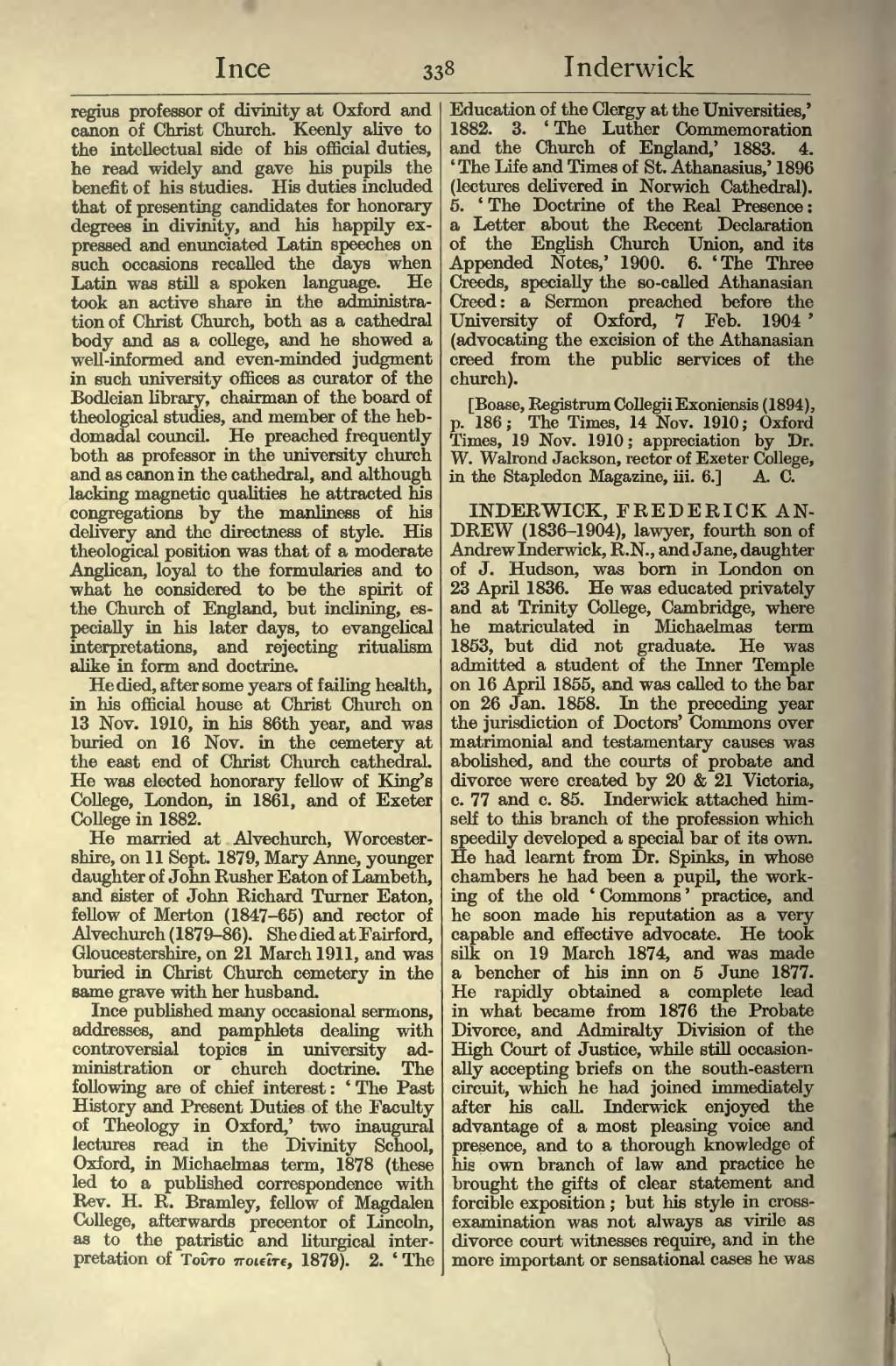regius professor of divinity at Oxford and canon of Christ Church. Keenly alive to the intellectual side of his official duties, he read widely and gave his pupils the benefit of his studies. His duties included that of presenting candidates for honorary degrees in divinity, and his happily expressed and enunciated Latin speeches on such occasions recalled the days when Latin was still a spoken language. He took an active share in the administration of Christ Church, both as a cathedral body and as a college, and he showed a well-informed and even-minded judgment in such university offices as curator of the Bodleian library, chairman of the board of theological studies, and member of the hebdomadal council. He preached frequently both as professor in the university church and as canon in the cathedral, and although lacking magnetic qualities he attracted his congregations by the manliness of his dehvery and the directness of style. His theological position was that of a moderate Anglican, loyal to the formularies and to what he considered to be the spirit of the Church of England, but inclining, especially in his later days, to evangelical interpretations, and rejecting ritualism alike in form and doctrine.
He died, after some years of failing health, in his official house at Christ Church on 13 Nov. 1910, in his 86th year, and was buried on 16 Nov. in the cemetery at the east end of Christ Church cathedral. He was elected honorary fellow of King's College, London, in 1861, and of Exeter College in 1882.
He married at Alvechurch, Worcestershire, on 11 Sept. 1879, Mary Anne, younger daughter of John Rusher Eaton of Lambeth, and sister of John Richard Turner Eaton, fellow of Merton (1847-65) and rector of Alvechurch (1879-86). She died at Fairford, Gloucestershire, on 21 March 1911, and was buried in Christ Church cemetery in the same grave with her husband.
Ince published many occasional sermons, addresses, and pamphlets dealing with controversial topics in university administration or church doctrine. The following are of chief interest : 'The Past History and Present Duties of the Faculty of Theology in Oxford,' two inaugural lectures read in the Divinity School, Oxford, in Michaelmas term, 1878 (these led to a published correspondence with Rev. H. R. Bramley, fellow of Magdalen College, afterwards precentor of Lincoln, as to the patristic and liturgical interpretation of Τούτο ποιείτε, 1879). 2. 'The Education of the Clergy at the Universities,' 1882. 3. 'The Luther Commemoration and the Church of England,' 1883. 4. 'The Life and Times of St. Athanasius,' 1896 (lectures delivered in Norwich Cathedral). 5. 'The Doctrine of the Real Presence : a Letter about the Recent Declaration of the English Church Union, and its Appended Notes,' 1900. 6. 'The Three Creeds, specially the so-called Athanasian Creed: a Sermon preached before the University of Oxford, 7 Feb. 1904' (advocating the excision of the Athanasian creed from the public services of the church).
[Boase, Registrum Collegii Exoniensis (1894), p. 186; The Times, 14 Nov. 1910; Oxford Times, 19 Nov. 1910 ; appreciation by Dr. W. Walrond Jackson, rector of Exeter College, in the Stapledon Magazine, iii. 6.]
INDERWICK, FREDERICK ANDREW (1836–1904), lawyer, fourth son of Andrew Inderwick, R.N., and Jane, daughter of J. Hudson, was born in London on 23 April 1836. He was educated privately and at Trinity College, Cambridge, where he matriculated in Michaelmas term 1853, but did not graduate. He was admitted a student of the Inner Temple on 16 April 1855, and was called to the bar on 26 Jan. 1858. In the preceding year the jurisdiction of Doctors' Commons over matrimonial and testamentary causes was abolished, and the courts of probate and divorce were created by 20 & 21 Victoria, c. 77 and c. 85. Inderwick attached himself to this branch of the profession which speedily developed a special bar of its own. He had learnt from Dr. Spinks, in whose chambers he had been a pupil, the working of the old 'Commons' practice, and he soon made his reputation as a very capable and effective advocate. He took silk on 19 March 1874, and was made a bencher of his inn on 5 June 1877. He rapidly obtained a complete lead in what became from 1876 the Probate Divorce, and Admiralty Division of the High Court of Justice, while still occasionally accepting briefs on the south-eastern circuit, which he had joined immediately after his call. Inderwick enjoyed the advantage of a most pleasing voice and presence, and to a thorough knowledge of his own branch of law and practice he brought the gifts of clear statement and forcible exposition ; but his style in cross-examination was not always as virile as divorce court witnesses require, and in the more important or sensational cases he was
